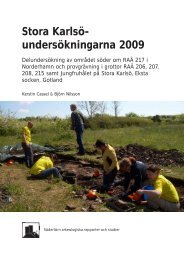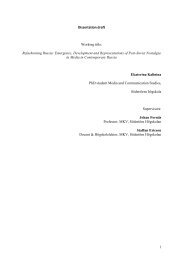CIVIL SOCIETY IN PEACEBUILDING - A Case Study Analysis of ...
CIVIL SOCIETY IN PEACEBUILDING - A Case Study Analysis of ...
CIVIL SOCIETY IN PEACEBUILDING - A Case Study Analysis of ...
Create successful ePaper yourself
Turn your PDF publications into a flip-book with our unique Google optimized e-Paper software.
7.3.1 The Civil Society and Post-conflict buildingPeacebuilding refers to the constructive steps taken to settle disagreements that prompt conflict inorder to bring lasting peace. Whether civil society organizations contribute to post-conflictpeacebuilding or exacerbate and perpetuate violence, conflicts and disagreements are dependent on thecreation and reproduction <strong>of</strong> social capital. Some civil organizations <strong>of</strong>ten undermine or deplete suchsocial resources in pursuit <strong>of</strong> particular or sectarian interests and therefore they are destroyers ratherthan builders <strong>of</strong> peace. It is for this reason, very important for civil society organizations whose activatesfoster respect, equality, trust, reciprocity, norms <strong>of</strong> cooperation and tolerance enhance constructive rolesin post-conflict peace building and in conflict-ridden societies (Edwards 2004:176). A stable peaceachievement is invariably the result <strong>of</strong> a win-win method <strong>of</strong> conflict resolution and consequently <strong>of</strong> theability to live side by side with one’s opponents in spite <strong>of</strong> difference. This is only possible in a situationwhich parties to a conflict are able and willing to empathize the plight and causes <strong>of</strong> their adversariesand when the needs <strong>of</strong> all parties in a conflict are satisfied. As long as the parties remain locked in azero-sum-game without any consideration to their needs, worries and interests <strong>of</strong> the other party, nopeace can be achieved. It is here where the critical role <strong>of</strong> civil society can play in building bridges <strong>of</strong>communication, trust, respect, and recognition in pursuit <strong>of</strong> truth, justice, peace and forgiveness withoutbeing blinded by national, ethnic, religious, partisan or sectarian interests (Chazan 1992:98). Unlessthese core values are made the centrepiece <strong>of</strong> any process <strong>of</strong> reconciliation, no durable peace is possiblein any post-conflict or conflict-ridden societies.17
















